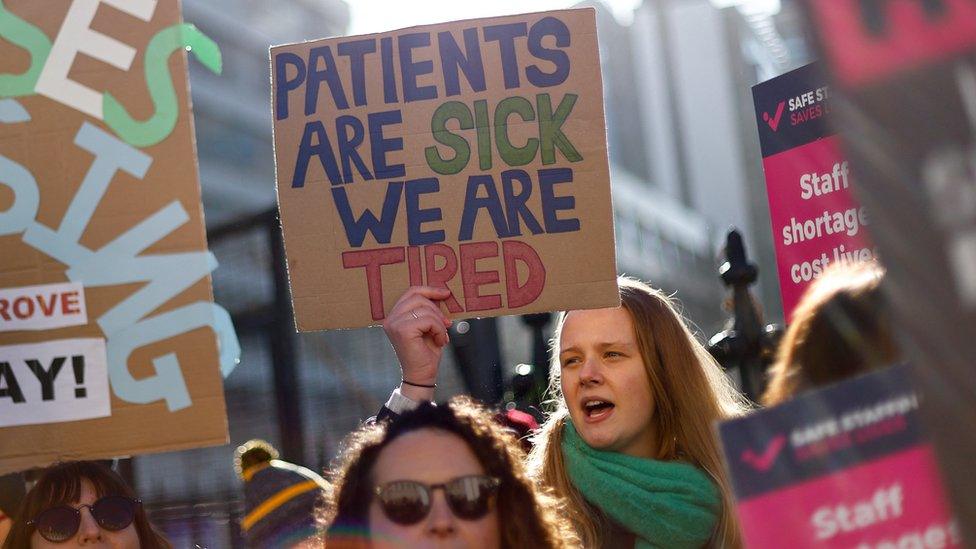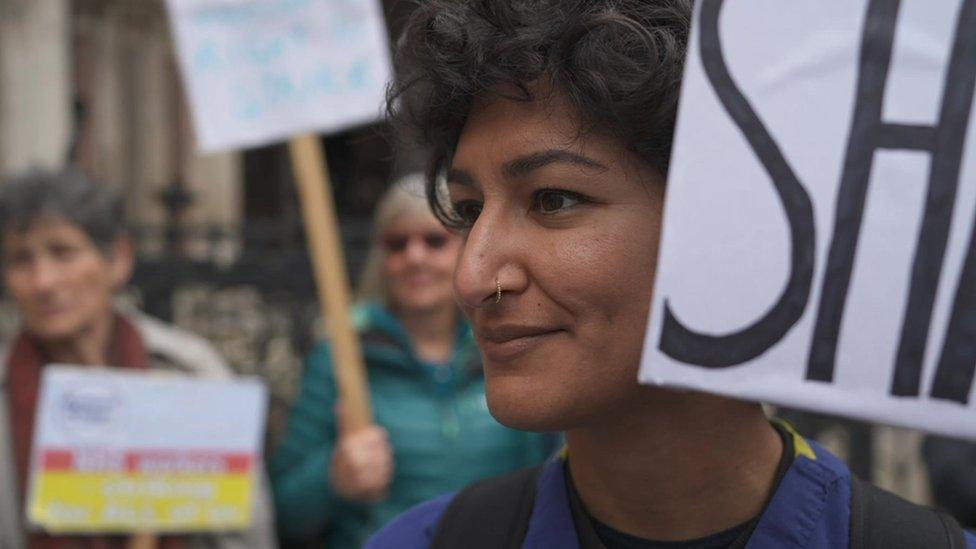Nurses' strike: Concern for patients ahead of England walkout
- Published

The walkout will affect emergency departments, intensive care, cancer wards and other wards
Nurses in half of England's hospitals, mental health and community services will go on strike later with NHS chiefs warning care is at risk.
The walkout by Royal College of Nursing members will start at 20:00 BST and run until the end of Monday.
Nurses will be walking out of critical services such as intensive care for the first time.
But some local trusts have been given their own exemptions to maintain life-preserving care.
Around one in six NHS trusts facing industrial action are being allowed to call some nurses off the picket line to staff areas such as A&E, intensive care and children's services.
In these areas strikes will still continue, but a small number of RCN members will be asked to work to provide a minimum standard of cover and meet the legal requirement on trade unions for life-and-limb cover to be provided.
Health Secretary Steve Barclay expressed disappointment at the escalating strike action but said he welcomed "local mitigations" for critical services. However, he said the lack of national exemptions "risks patient safety".
"These strikes will put more pressure on the NHS and will be incredibly disruptive for patients," Mr Barclay said, urging members of the public to attend appointments unless otherwise told by the NHS, to call 999 in life-threatening emergencies, and to use NHS 111 online services for non-urgent health needs.
Julian Hartley, of NHS Providers, which represents health managers, said this walkout was still "the most worrying so far".
He said some were really "struggling" to staff services.
Nick Hulme, chief executive of East Suffolk and North Essex NHS Foundation Trust, said the strikes would cause "significant disruption" and "increased risk to patients", but that significant planning had gone into services to ensure they were "as safe as they can be".
"I am concerned. I'm sure that we will be able to provide safe services - the public can be assured that they'll be safe - but there will be significant disruption," he told BBC Breakfast.
He called on both parties involved to compromise to find a quick solution.
On Friday, Great Ormond Street Hospital (GOSH) said it had "serious" staffing concerns over this weekend's nurses' strike.
The world-renowned London children's hospital declared a "business continuity incident".
The warning prompted the RCN to allow some members to be called into 11 different areas of the hospital, including intensive care.
A host of other NHS trusts have also been granted exemptions, including Newcastle's transplant service, Sheffield's children's hospital and London's Guy's and St Thomas' emergency department.
The NHS is advising people who are seriously ill or injured to call 999 as usual, but non-urgent cases should call 111.

'I'm dismayed it's come to this - cancer nurse'

Preya Assi, a cancer nurse at University College London Hospital
Cancer nurse Preya Assi has not taken strike action so far because her team at University College London Hospital has been exempted during previous walkouts.
It was deemed a critical service by the RCN so members were asked to stay at work while colleagues from other parts of the NHS took to the picket line.
But this time there are no national exemptions so Ms Assi will be involved.
She said: "I feel dismayed. I and all my colleagues had been hoping it would not come to this."
She said the pay offer made by the government was "untenable" because of inflation, which had left nurses struggling to pay their bills and look after their families.
"This is not an action we take lightly, but it feels like there is no other way to get them to take notice of our plight."

The RCN said the union would ensure life-and-limb cover was provided if NHS trusts could not staff services using nurses who were not striking or other staff. Around a third of nurses are not members of the RCN.
But general secretary Pat Cullen said members had been forced into this action because the government did not value them "enough to pay fairly".
"If the government treated nurses fairly, this sorry situation would be finished," she said.
"We are intensifying the action because the strike so far has not produced a good enough offer from ministers."
The RCN walkout was originally due to run until 20:00 BST on Tuesday, but was cut short following legal action by ministers.
The High Court ruled last week that the strike action on Tuesday was unlawful because the six-month mandate for action had expired.
Members of Unite, one of the smaller health unions, will also be taking action in two services on Monday - London's Guy's and St Thomas' Hospital and the Yorkshire Ambulance Service.
The strike was called earlier this month after RCN members rejected a government offer for England of a 5% pay rise for 2023-24 and a one-off payment of at least £1,655 to top up last year's salary, depending on staff grade.
RCN leadership had recommended members accept the offer but it was rejected by 54% to 46%.
Nurses have already walked out twice this year - on 6 and 7 February and on 18 and 19 January - but on those dates there were exemptions, so nursing cover was maintained in critical areas such as intensive care, chemotherapy and dialysis.
The RCN has said it would ballot members for further strike action once this walkout is over.
The industrial action comes ahead of a crucial meeting between unions, ministers and NHS bosses on Tuesday.
The pay offer covers a total of 14 health unions - basically all NHS staff except doctors - and if a majority back it, the government will sanction the pay rise.
Voting is weighted according to size, but with the biggest NHS union, Unison, backing it along with those representing midwives, physios and the GMB, which includes ambulance workers and other staff, union sources said it was "almost certain" the deal would be agreed.
Nurses would get the pay rise if that is the case as under the agreement all NHS staff on the Agenda for Change contract get the money or none do.
The RCN would still be free to take strike action in the future however if a majority of its members vote for it in the new ballot, the results of which are expected in late June.

Are you affected by issues covered in this story? Share your experiences by emailing haveyoursay@bbc.co.uk, external.
Please include a contact number if you are willing to speak to a BBC journalist. You can also get in touch in the following ways:
WhatsApp: +44 7756 165803
Tweet: @BBC_HaveYourSay, external
Please read our terms & conditions and privacy policy
If you are reading this page and can't see the form you will need to visit the mobile version of the BBC website to submit your question or comment or you can email us at HaveYourSay@bbc.co.uk, external. Please include your name, age and location with any submission.
Related topics
- Published19 March 2023
- Published15 April 2023
